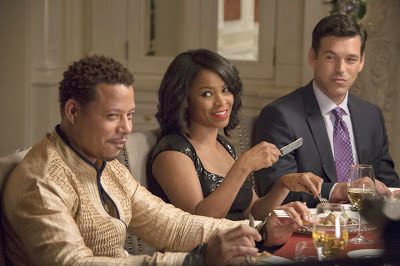Mark Anthony Neal's Blog, page 855
November 17, 2013
MHP Show: Grace Lee Boggs on "What it means to be a Revolutionary"
 MHP Show
MHP ShowWriter and activist Grace Lee Boggs and Grace Lee, director of “American Revolutionary,” join to discuss Detroit and the history of activism in America.
Published on November 17, 2013 05:12
November 16, 2013
'Ali and Wallo watch The Wire': excerpts from 'Sorry For Partying' – a Novella
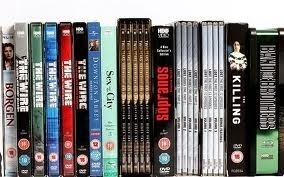 For Ali and Wallo, being young lovers meant having sex, drinking, eating stir fry, and watching The Wire.
For Ali and Wallo, being young lovers meant having sex, drinking, eating stir fry, and watching The Wire.'Ali and Wallo watch The Wire': excerpts from 'Sorry For Partying' – a Novella by Tessa Brown | special to NewBlackMan (in Exile)
For Ali and Wallo, being young lovers meant having sex, drinking, eating stir fry, and watching (re-watching) The Wire. On what was beginning to seem like more nights than not, they could be found in Ali’s Pilsen bedroom, discussing the representational merits of the cultural text at hand. Despite its near-perfection, The Wire still had some faults.
“How come the black women are all lesbians and hookers?” Ali asked. She reached for her whiskey beside the bed, where it was sweating on a stack of unused LSAT study books.
“There was that black lady crackhead,” Wallo offered.
“And what about the white dudes? We’re all buffoons?”
“Yes,” said Ali. “It’s making a point.”
“That the writers hate white guys?”
Ali took a sip of her drink, then lifted her chin for the stump speech. “That white supremacist patriarchy is morally bankrupt and overly invested in phallic displays of power.”
“I’ll show you a phallic display of power.” Wallo grabbed her around the waist. Ali giggled. On the screen, said black female lesbian and white male buffoon prepped a crackhead snitch while a bunch of young bucks loitered in the background, cleverly visible through their police car windshield.
Watching with Wallo was hard enough, given that Ali had already seen the full run in high school when the debut of an epic drama about Baltimore’s criminal justice system was reason enough for her father, a Baltimore lawyer previously opposed to cable television, to splurge for cable so that he could watch The Wire with his wife and his daughter every Sunday until she left for college. On first watch, the show had been a revelation, a careful charting in narrative of the complex systemic failures that lent the Jacksons’ Baltimore existence its peculiar post-apocalyptic flair. But now, the second time around, laying half-drunk in bed with Wallo, Alison felt painfully aware that the men and women on the screen before her were actors, successful actors, performing what for many of them was as foreign a dialect as Shakespearean English.
“This is not the real criminal justice system,” Ali said to the ceiling.
“Ceci n’est pas un crack pipe,” said Wallo. “But it’s enough for an arrest!”
English, Ali thought, as she and Wallo stood waiting for the bus the next morning, was not exchanged daily in the measured, rolling tones articulated by even the most grisly of junkies on The Wire. Why, even right here, on an arbitrary corner of south-central Chicagoland, at one of what must have been tens of thousands of bus stops city-wide whose waiting denizens’ ancestors once spanned the globe, the heaving vicissitudes of language were as apparent as in the Cross-Cultural Linguistics textbook Ali had studied as a sophomore in college. Beside her, a woman was yammering into her cell-phone in rapid-fire Spanish. Ali tried not to listen but certain English words—iPhone, data plan—stuck out even above the rush-hour din. Unlike actors, real humans, from the meanest on up, dispensed language like a gooey soup over whose original ingredients speakers had little control. Behind her, Wallo stood with his headphones on, impervious to the teeming masses jostling past them on the sidewalk and jockeying for first place onto the anticipated bus.
For a year she’d waited for this bus with Carmen, not Wallo, and together they’d parsed these streets, this Chicago life. They’d made themselves meaningful together. It was Carmen who’d taught her about syncretism, a concept he’d studied at Oklahoma State. Syncretism: that despite colonists’ best efforts, cultural exchange flowed in two directions. English, Carmen said, wasn’t an Emperor who came to a foreign land and replaced all the laws; no, English was the blankets brought by the Emperor’s men, distributed to the people one township at a time. Her job, and Carmen’s, was to minister these people’s children, to monitor their blankets for holes, lice, unraveling, help them embroider it or sew on patches if they wanted to but mostly make sure that when these kids ventured out into that cold, bitter Anglophone world, that they were protected, and that the gatekeepers would recognize their clothes.
The bus pulled up before them, a heaving iron mammoth bouncing back on its heels. The doors pushed open like a jaw, waiting for some morsel to crawl inside. This bus wanted company more than anything. Wallo waded forward toward the back of the bus, his messenger bag firm against his back. Ali followed carefully. She sidled sideways, struggling to keep her tote behind her instead of bumping the seated passengers’ heads. They sat down across from each other in the raised section toward the rear.
Next to Ali, a Black woman was chiding the man sitting next to her. “Honey, I done told you,” the woman said. Her coat was pulled closed, and her purse sat firmly on her lap. “Them lines won’ fly.”
“Baby, you ain’t said nothin’ of the kind,” the man said. Ali tried to watch them from the corner of her eye. The man, with his gentle insistence against the woman’s stony front, was clearly coming on to her. Ali wondered if they were friends. Or maybe they’d just met on this bus, ten minutes ago. Had the woman said been told or done told? That would give a clue. A linguistics table floated between Ali’s eyes, somewhere over Wallo’s head, a lexicon she’d studied years ago.
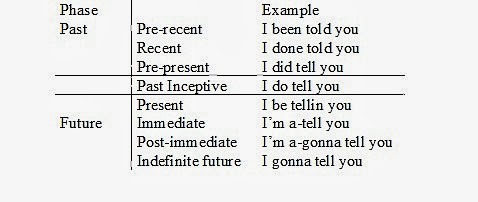
Ali remembered cramming for a quiz on verb tenses and phases in her African American Vernacular English course, struggling to stay focused through the honey-thick irony that threatened to suffocate her will. Even now, years later, the absurdity of it still stung. She imagined her ancestors (slaves, of course, though she preferred not to think of it), bug-eyed at their upper-middle class scion with her gratefully pale skin, daughter of homeowning professionals, an honor student at the nation’s finest Historically Black College for women, Spelman College in Atlanta, Georgia, studying some backcountry, field-hand vernacular and callin’ that book learnin’?! Now that was the white man’s devilment if there ever was. In all Ali’s years as a Linguistics major that was the course in which she had fared the worst. While some of her classmates had snickered behind dark hands at seeing their discarded verb forms canonized in a textbook, Ali had never spoken this vernacular tongue at home, had certainly never wished to ‘til now. Struggling with been’s and done’s and did’s, she’d never felt whiter than she had studying for that low-down test.
Across from her, Wallo grinned, a big guileless dude of a smile. Oh, brother, Ali thought. What kind of a quicksand is this?
***
Tessa Brownis a PhD student in Composition and Cultural Rhetoric at Syracuse University, where she studies hiphop composition pedagogy. Her novella "Sorry For Partying" was a runner-up for the 2013 Paris Literary Prize, and you can read it all on Medium. Hit her up @tessalaprofessa.
Published on November 16, 2013 14:26
November 15, 2013
Totally Biased: Interview w/ Dr. Yaba Blay--author '(1)ne Drop: Shifting the Lens on Race'
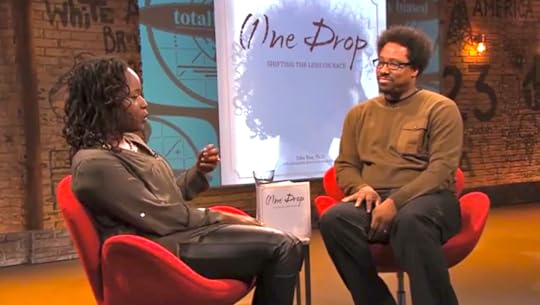 Totally Biased with W. Kamau Bell
Totally Biased with W. Kamau BellKamau interviews professor, producer and publisher Dr. Yaba Blay . They discuss her book (1)ne Drop: Shifting the Lens on Race , black identity and her twitter love for the TV show Scandal.
Published on November 15, 2013 16:13
This is the "Final Act": Ending Violence Against Black Women (for Renisha McBride) by Brothers Writing to Live
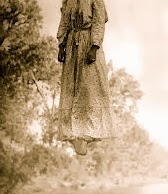 The lifeless body of Laura Nelson (1911)
The lifeless body of Laura Nelson (1911)This is the "Final Act": Ending Violence Against Black Women (for Renisha McBride)by Brothers Writing to Live
We begin this statement for justice in response to the murder of Renisha McBride by starting at "home.
We are a collective of black men who write in community, who desire a future free of structural violence and physical violation—especially violence that overwhelmingly impact women and children. While we write to add our voices to the collective call for justice in response to the murder of Renisha, we are also aware of our own complicity in systems of male domination that impact women we do and do not know on a regular basis. Given that, we name sister comrades with whom we are in community like Brittney Cooper who recently experienced violation by a man and say to her: we stand with you and don’t condone any act of violence that places you and any women in harm.
And to the brother: we, like you, have work to do on ourselves. Indeed, our first work must be a commitment to critical self-reflection, the kind that allows us to hold ourselves accountable to the politics we maintain. And the second is the process of self-transformation. Our sisters do not need more enemies and too often we, black men, have been the most aggressive! They need our solidarity, love, and care so that we don't have to mourn the loss of another black woman, like Renisha.
Renisha McBride did not have to die. If she lived in a world that did not criminalize the bodies of black youth, she would not have died by a gunshot to her face. If she lived in a world that saw her as a human worthy of care, she would not have been killed by a man who was allegedly seeking to protect himself and his property. If she lived in a world that did not perfect the brutal skill of violating the black female body, she would certainly not have been killed and days later her murderer remained free.
Unfortunately, Renisha did not have the luxury of living in a society free of the type of rabid structural violence that allows black girls in need of help to be shot and killed. Ours is a society where 12 black women can be killed in one location and within a short span of time, like Boston in 1978-79, and there is no outcry. But the murder of 12 innocent black women was the “final act” for the black feminists who formed the Combahee River Collective in response. The murder of Renisha is the final act for us.
Renisha was killed after getting into a car crash and seeking help at a nearby home. Theodore Wafer opened the door with his shotgun at the ready and shot her in the face. Did he even try to see her?
How could he? In a world that chooses not to see black women and girls every day. We (black men, white men, and white women—some of us anyway) ignore their pain, their triumphs, their hopes, their goals, their wounds, and proceed as if they are not a part of the human family. We use their bodies as an outlet to express our rage and frustration. We discard them after we use them for our pleasure. And we convince ourselves they are okay despite violation.
Theodore Wafer walked free for nearly two weeks before being charged with any crime because Renisha's life, as a black girl, in a white supremacist patriarchy, was meaningless. But we come together to expose such lies and to unite in solidarity with those who speak Renisha’s name so that we will not forget: Renisha’s life matters. Renisha’s death matters. Black girls matter. We are putting the world on notice. The dehumanization and invisiblilizing of black women will no longer stand.
How many black girls must suffer before we black men say it’s enough?
We condemn the killing of Renisha McBride. We condemn the violence that continues to plague black women in this country. We condemn the society that not only allows but supports that violence because it does not value black women’s lives. We condemn the laws that embolden their killers. We condemn the mentality that causes us all to turn a blind eye while our sisters are beaten and killed. We condemn the parts of ourselves that have been complicit in fostering black women’s pain.
We speak Renisha’s name the same as we speak the names Marissa Alexander, Islan Nettles, Sakia Gunn, Miriam Carey, CeCe McDonald, Aiyana Stanley-Jones and all black women and girls who have been taken from us, whether locked away in cages or buried in the earth, because we love them.
We speak Renisha’s name to remind ourselves that we too are part of the problem if we fail to speak up and stand alongside our sisters in their struggle against sexism, rape, patriarchy, and other forms of violence.
We speak Renisha’s name because we love our black mothers, sisters, grandmothers, little cousins, neighbors, students, daughters, nieces, co-workers, comrades, teachers, and so many others too much to allow them to be hurt by hands, guns, laws, and our silences.
And we speak Renisha’s name among a community of brothers as a call to action, a call for brothers to actively participate in the struggle to end the violenceKiese Laymon, Writer & Professor at Vassar CollegeMychal Denzel Smith, Writer, Mental Health Advocate, & Cultural CriticKai M. Green, Writer, Filmmaker, & Ph.D Candidate at USCMarlon Peterson., Writer & Youth & Community AdvocateMark Anthony Neal, Writer, Cultural Critic, & Professor at Duke UniversityHashim Pipkin, Writer, Cultural Critic, Ph.D. Candidate at Vanderbilt UniversityWade Davis, II, Writer, LGBTQ Advocate, & Former NFL PlayerDarnell L. Moore, Writer & Activist
Published on November 15, 2013 15:17
'Left of Black' on The Root TV: Akinyele Umoja discusses Book 'We Will Shoot Back: Armed Resistance in the Mississippi Freedom Movement'

On this segment of Left of Black on The Root TV, host and Duke Professor Mark Anthony Neal talks with Professor Akinyele Umoja about his latest book We Will Shoot Back: Armed Resistance in the Mississippi Freedom Movement (New York University Press, 2013).
Check for the full interview on Monday, November 18, 2013 at Left of Black
Published on November 15, 2013 09:35
November 14, 2013
"Who I am, is a gift from God"--Julia Wallace for the Many Voices Video Campaign
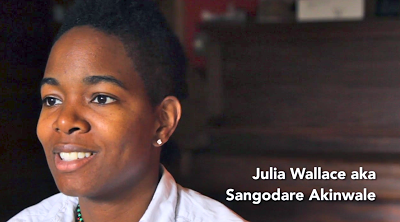 Many Voices Video Campaign
Many Voices Video Campaign
The Many Voices Video Campaign Illuminates the powerful presence of Black Gay and Transgender Christians within The Church.This edition features Julia Wallace, Co-Founder of the Mobile Homecoming Project. Julia grew up in a family full of preachers and while she was embraced by her father, also a preacher, she often experienced homophobic and transphobic messaging from her family and church. She discusses how she navigated through those experiences to claim and pursue her own unique purpose in life.Created by Katina Parker for Many Voices. vimeo.com/katinaparkerMusic by Julia Wallace, Rachael Derello, Katina Parker.Follow Many Voices here:
facebook.com/manyvoicesorg
twitter.com/manyvoicesorg
youtube.com/manyvoicesorg
pinterest.com/manyvoicesorg
flickr.com/manyvoicesorg
instagram.com/manyvoicesorg
manyvoicesorg.tumblr.com
Published on November 14, 2013 19:24
Tell Me More: Terrence Howard & Sanaa Lathan Dish On 'The Best Man Holiday'
Published on November 14, 2013 19:00
Transgender Support Community in Detroit Speaks Out after Increased Violence
 WJBK
WJBKMembers of the transgendered community say, after losing another member to violence, they are ready for the violent acts against them to stop.
Detroit police discovered a body inside an alley trash can Friday night off Woodward Avenue. Members of Detroit's transgender community say the victim was one of their own.
Researchers and a local filmmaker are working to raise awareness on the violence directed towards transgendered people here in Metro Detroit.
Filmmaker Dream Hampton says when trans women are murdered, it often involved brutality, dismemberment and torture.
One mother whose trans daughter, Shelly, was murdered two years ago calls the acts an "epidemic" and that trans people are "treated like they're not even humans."
Hampton is producing a documentary sharing Shelly's story in her mother's quest for justice.
Meanwhile, the Ruth Ellis Center provides a safe space for LGBTQ youth. Jerry Peterson, the center's executive director, says the center works with approximately 100 transgendered youth every year, and that many have been forced to the streets to become sex workers to survive.
Peterson says a lack of understanding about the transgendered community can lead to violence, so he explains what it means to be transgendered, saying, "Our biological sex assigned at birth may be male, but who we understand ourselves to be, our hormonal balances, everything that happens inside, we understand ourselves to be female - or the opposite."
Read more: http://www.myfoxdetroit.com/story/23962531/transgender-support-community-speaks-out-after-increased-violence#ixzz2kdGTNGLF
Published on November 14, 2013 06:49
November 13, 2013
Lessons from Left Eye by Adia “Dr. Dia” Winfrey, Psy.D.
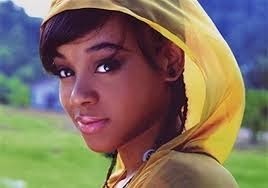 Lessons from Left Eyeby Adia “Dr. Dia” Winfrey, Psy.D. | NewBlackMan (in Exile)
Lessons from Left Eyeby Adia “Dr. Dia” Winfrey, Psy.D. | NewBlackMan (in Exile)After the initial airing of CrazySexyCool, a 17-year-old girl who has been in my mentoring program for three years, said, “I thought of you Doc when I heard Left Eye talk. Things she said sounded just like you.”
After thinking for a moment, I replied, “Because much of what I say came from her. My friend Alicia worked with Left Eye during the last years of her life, and was with her in Honduras at the time of her death.”
It was in this moment I realized the vast expanse of Left Eye’s impact and the potential we each have to affect the lives of many.
My friend Alicia served as my creative advisor for several years. In addition to assisting with my image, she challenged me to expand the realm of my thinking. She directed me to various readings and videos exploring new age concepts. It was in this capacity she began sharing the artist and personal development lessons Left Eye shared with her. Alicia would often say, “These lessons were not supposed to be buried with Lisa. She gave me this knowledge so I could share it.”
Here are three of the most influential lessons passed on to me from Left Eye through my friend and creative partner Alicia:
1.) Be aware of your thoughts and frequency because they reflect back to you. Literally.
Alicia introduced me to this idea and the concept of “law of attraction” during our earliest lessons. When describing the remote LaCieba, Honduras village, she said Left Eye warned them to avoid fearful thoughts because they would quickly manifest into reality. Alicia stated mind over matter became everything, as a strong fear of an insect could rapidly lead to the gathering of a swarm of insects.
This lesson ushered me into a manner of thinking that I have shared with thousands of youth and professionals globally.
2.) We must be deliberate about what we put into our bodies.
Left Eye’s discipline amazed me when our lessons moved towards nutrition and physical health. Veganism and organic food consumption are gaining popularity today, however during Left Eye’s lifetime they were progressive. She encouraged those she mentored to make fruits and vegetables the primary components of their diets. I learned Left Eye had several longstanding physical conditions that reversed when she changed what she consumed.
This lesson introduced me to the work of Dr. Sebi and the healing power of nature.
3.) Energy never dies.
The concept that energy never dies but transcends highlights a compelling experience of how lives can connect in remarkable ways. While I did not know Lisa “Left Eye” Lopes in life, I have felt her presence since her passing. The lessons she shared with my friend have shaped my thinking, lifestyle, and global movement.
Left Eye’s energy reverberates at her final resting place as well. Alicia and I have witnessed remarkable events that made us smile and say, “We see you Lisa!”Left Eye believed life was more than this physical existence marked by our birth and death dates. She understood our inextricable link to one another.
This lesson continues to offer teachable moments, as highlighted by the call I received from the 17-year-old girl in my mentoring program.
Left Eye’s only solo album, Supernova, was released overseas a year before her passing. A supernova occurs when a star explodes in our universe emitting a blindingly bright light that radiates more energy than our sun in its entire lifetime. Based on my lessons from Left Eye, this describes her perfectly.
***
Dr. Dia is an author, psychologist, and rap lyricist. She has been a guest on several television and radio programs including the Tom Joyner Morning Show, National Public Radio, and InContact Atlanta, and featured in JET Magazine. Dr. Dia and Left Eye’s recording engineer, Alicia (also known as 4Bia or DJ Lady Cherry) are completing a book exploring Left Eye’s holistic lifestyle, through lessons and narrative stories. Left Eye mentored Alicia until her untimely death on April 25, 2002.
Learn more about Dr. Dia at letsgethype.com.
Published on November 13, 2013 12:54
One Big Chess Game by Adisa Banjoko
 One Big Chess Gameby Adisa Banjoko, Founder Hip-Hop Chess Federation | special to NewBlackMan (in Exile)
One Big Chess Gameby Adisa Banjoko, Founder Hip-Hop Chess Federation | special to NewBlackMan (in Exile)Let these beats play, as I slay dragons from Sicily/ My Yugoslav attack broke his back took Italy/ Like Hannibal breaking a cannibals mandible, yo/ Confused ‘cause you’re stuck in the matrix? Understandable - The Bishop, One Big Chess Game
My first few days teaching life strategies to at-risk and gang impacted youth using chess, I met three Latino boys. The first was heavyset with black marble eyes, dark curly hair and a body like Baby Huey. The second was super thin with reddish brown Aztec skin, small beady eyes and an unusually slim face. The third, at first glance you might miss really easy. He had an average build, average height but a very sweet smile. Oddly though, his eyes had no emotion- like a snake. It was deeply unsettling. That’s what I remember about meeting him for the first time. I recall going home and telling my wife “I think I met a killer today.”
That year Baby Huey and I became real close. He was fascinated by science, and good at it. But as we approached summer things changed. Baby Huey lived in a bad area. I had no contact with him over the summer and there was gang turf conflict all over his hood. When school was back in, Baby Huey returned a banger. The boy I knew was gone. I lost him to the streets.
A few months later Slim Face caught a murder case. I never really connected with Slim Face. He never cared about my ideas. He just wanted to get out of class and kick it with his other homies. But Snake Eyes, he quietly thrived.
We played chess a lot. Slowly Snake Eyes opened up a little, but not much. I knew his family had some gang ties. Snake Eyes said he wanted something different for himself. He never allowed me to take his picture. Any time photos were being taken he would always pull me aside and remind me that he was thankful that I was helping him, but to never show his picture.
One day, Snake Eyes beat one of the algebra teachers in chess. The teacher was hot under the cardigan that day. He went so far as to accuse Snake Eyes of cheating. But I video taped the whole game and exonerated Snake Eyes. The teacher was enraged that he lost to a boy written off as a thug in a game as intellectually rich as chess. It was hard not to laugh.
I had his back the whole way, and so did some others. Snake Eyes made it happen though. He graduated on time to the shock of many in the faculty. As a graduation present I got him some Timberland boots and the librarian gave him a chess set and some other small gifts. After graduation, the librarian came to me looking very shaken. The boots, the board and everything else we had given him were in a box with a piece of paper on top of it. The paper had gang tags all over it. Snake Eyes had chosen the streets.
I started the Hip-Hop Chess Federationin 2006 to help kids struggling in school live more full lives. Our organization fuses music, chess and martial arts to promote unity, strategy and nonviolence. When we began, few understood my mission or understood the interconnected histories and philosophies of Hip-Hop, chess and the martial arts here in America. Despite many studies that illustrate the power of chess on the human mind, I still oddly get resistance about why American schools need chess now more than ever. But it cannot be the chess of the past where we sterilize minds with algebraic notation and tactical approach alone. We cannot let them define their existence solely on their chess rating. It must be a chess game that oxygenates the mind with survival skills. Skills that allow it to flourish in real time.
Throwing kids into “the black and white jungle,” as Garry Kasparov so eloquently described the game of kings, helps youth develop short and long-term planning. It also helps them learn how to cultivate and defend their ideas. It guides them to know the wisdom of when to retreat, and learn how to finish what they started. It gives them the time to figure out how to best hold a position, and discover how to recover from loss. These things and more are explored in almost every chess match.
Today more than ever American children need to develop strategic thinking.
In my comings and goings, I have begun to see the world as my students see it. Each morning I tighten my cap as I stride beneath the serene navy sky, watching the moon set on the city of San Francisco. I ascend quickly, revolted by the littered, urine caked stairwells of the BART station. Alert for the slightest movements beneath the shadow of leaves, I walk along sidewalks guiding me through San Francisco's venomous Mission District. Random, deadly violence is common. I’m on my on my way to work. Prostitutes and heroin addicts sprint from beneath the creeping rays of sun and the police cars, with an equal hatred for both.
 It is under this same sun that the kids I hope to engage seek to thrive. The great potential within the acorn of the mighty oak is rendered irrelevant under the of broken promises and initiatives. Every week there is a new cool school district buzzword meant to help parents and citizens understand the latest stratagem for scholastic achievement. No matter how much I try, I feel our efforts are nothing more than just a cruel joke educators play on themselves, as if they’ve honestly tried. These are pre-packaged by well-meaning but grossly ineffective administrators who are either ignorant of the way they run, or assassins who profit off the minds of the young. To be clear, in what I’ve observed most teachers are not to be blamed. Teachers are underfunded and under-supported people with very little outside help.
It is under this same sun that the kids I hope to engage seek to thrive. The great potential within the acorn of the mighty oak is rendered irrelevant under the of broken promises and initiatives. Every week there is a new cool school district buzzword meant to help parents and citizens understand the latest stratagem for scholastic achievement. No matter how much I try, I feel our efforts are nothing more than just a cruel joke educators play on themselves, as if they’ve honestly tried. These are pre-packaged by well-meaning but grossly ineffective administrators who are either ignorant of the way they run, or assassins who profit off the minds of the young. To be clear, in what I’ve observed most teachers are not to be blamed. Teachers are underfunded and under-supported people with very little outside help.We can argue all day about who is at fault for the state of American public education. What no one can argue against though, is that chess helps lift math and reading comprehension skills as well as character.
In chess, one thing you learn quickly is that one mistake can cost you. Blunders on the board serve as the cornerstones of checkmate. I’m not sure how many mistakes the average player can make before the game is over. Depending on the depth of the blunder, they may never recover. Even a series of seemingly small blunders often leads one to a predictable death. On city streets, blunders cost young boys and girls their lives all the time.
In the song Iron Age by Ka and Roc Marciano, Roc says, “I can’t afford to be or move careless/ Niggas will put that Mac-10 to your spare ribs.” Sounds like chess doesn’t it? Inattentiveness on the streets will get you killed. Wearing the wrong colors, being in an area after dark, or using the wrong words can get you killed quickly on today's streets. But it’s always been like that, and chess has always taught us that lesson.
Only a few bars earlier Roc reflects on more productive things his wisdom could have accomplished “Honestly, I should have went to Stanford/ But what I learned scrambling wasn’t in the pamphlet.” How tragic that despite his strong mind, after having his soul ground against the poverty and violence of Brownsville, Brooklyn that he found himself embedded in the street life; also how his street knowledge seemed to clash with some of the practical wisdom college claims it has dominion over. Chess teaches us to constantly seek a great advantage with what they’ve already been given. It teaches personal responsibility and ownership of one’s actions.
Most people believe that the martial arts are paths taken by people who seek or enjoy violence. Shaolin Monks (revered by groups like the Wu-Tang Clan) are celebrated for their choice of nonviolence. Few make the direct correlation between their martial arts training and their practice of nonviolence. The demanding physical and mental endurance of kung-fu and other martial arts systems gives the practitioner patience, the potential consequences of conflict and emotional self mastery. Just like chess.
One of the things that differentiates what is known as Gracie (aka Brazilian) Jiu Jitsu from other martial arts is that there is a hierarchy of positional dominance. This focus on positional dominance, like chess, often leads one’s opponent to a chokehold or joint lock - like a checkmate. In chess and Jiu Jitsu, it is knowledge that gains one victory over innate gifts.
I spent the bulk of the next Summer thinking about Snake Eyes. Was all the work for nothing? Was he playing us the entire time? Was he even alive? I went back to school with a hollow heart, unsure of anything I was trying to teach kids. I figured I’d head to the library and talk to the librarian about how Snake Eyes cut ties so clean without either of us seeing it coming.
Staring at my suede Tims shuffling down the hallway, I bumped right into Snake Eyes. “Sup Adisa!” he said with eyes full of life. For the first time I saw light in his eyes. “Man I just wanted to thank you for being my friend. I appreciate you helping me graduate. I forgot my shoes and everything in the back after graduation. I was surprised it was still here. I gotta job man doing construction. I love it.” It turned out the paper was something he drew long before he met me. I found it in the trash in the library. My heart soared.
Endeavors like Hip-Hop, chess and martial arts help people learn to trust their own decisions, learn a respect for structure and how to be independent thinkers. Martial arts gives us a place to test our physical and emotional limits and face direct fears down. Hip-Hop lifts our spirits and can be a friendly reinforcement of ideas and ethics. On the streets one extra second of reflection on potential consequences can be the difference between war and peace, a misdemeanor or a felony and life and death. It’s that real. In the late 80’s and early 90’s African American youth used to rap music to remind themselves that they descended from kings and queens. If life is indeed one big chess game, lets teach our youth how to be kings and queens in their daily lives.
 The connections between Hip-Hop, chess and martial arts are as authentic as they are enlightening. The Street Games Vol. 1 Mixtape has several other songs that correspond to articles that illustrate our approach to life strategies. They include Chess Clock, 64 Squares in the Cipher, and A Technical Flow: Chess and Jiu Jitsu. Understand, the fusion of music, chess and martial arts is not a blanket solution for the many issues that our children face. But I know it can do much more than we have given them credit for. Our organization and our methodologies will be explained in greater depth in my upcoming book Live The Game in May 2014.
The connections between Hip-Hop, chess and martial arts are as authentic as they are enlightening. The Street Games Vol. 1 Mixtape has several other songs that correspond to articles that illustrate our approach to life strategies. They include Chess Clock, 64 Squares in the Cipher, and A Technical Flow: Chess and Jiu Jitsu. Understand, the fusion of music, chess and martial arts is not a blanket solution for the many issues that our children face. But I know it can do much more than we have given them credit for. Our organization and our methodologies will be explained in greater depth in my upcoming book Live The Game in May 2014.For more information on the Hip-Hop Chess Federation visit www.facebook.com/hiphopchess or listen to Adisa Banjoko’s podcast at www.bishopchronicles.com
Published on November 13, 2013 06:53
Mark Anthony Neal's Blog
- Mark Anthony Neal's profile
- 30 followers
Mark Anthony Neal isn't a Goodreads Author
(yet),
but they
do have a blog,
so here are some recent posts imported from
their feed.


